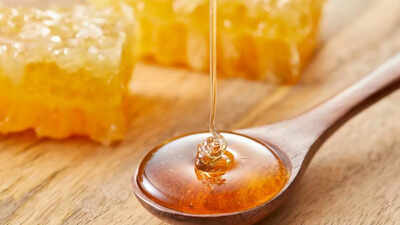Honey is more than just a natural sweetener; it may also support heart and blood vessel health. Research suggests that moderate honey intake could help lower systolic blood pressure due to its rich antioxidant and anti-inflammatory compounds, which improve blood vessel function and circulation. Honey also contains small amounts of potassium and magnesium, minerals that aid in regulating blood pressure. However, it’s important to remember that honey is still high in natural sugars and calories. Eating too much can contribute to weight gain or elevated blood sugar levels, which can increase the risk of high blood pressure over time. Therefore, moderation is key to enjoying honey’s potential heart-friendly benefits safely and effectively.
How honey affects blood pressure
A study published in the Saudi Medical Journal highlights that honey contains antioxidants and compounds that support blood-vessel health and may contribute to lowering blood pressure. Small-scale human trials found drops in systolic blood pressure after honey intake, though the effect is not large and the research is limited in scope. Health information platforms reinforce that honey is not a substitute for medical treatment and must be consumed in moderation.
- Vessel relaxation (vasodilation): Honey might boost nitric oxide availability, helping arteries relax and lowering pressure.
- Mineral support: Trace minerals like potassium and magnesium in honey assist in maintaining healthy blood vessel function.
- Antioxidant and anti-inflammatory action: These help protect vessel walls from damage, aiding healthy blood pressure regulation.
- Metabolic and lipid benefits: Improved cholesterol and blood-sugar markers linked to honey support overall cardiovascular health.
Why “too much honey” can be risky
Eating large amounts of honey comes with potential problems: It adds calories and sugar, which can cause weight gain, increased blood-sugar levels, and higher long-term blood-pressure risk. Importantly, most studies supporting honey’s benefits use small amounts and short durations, so relying on large doses isn’t supported by evidence.
Who should be cautious before using honey for blood pressure
- People with diabetes, as honey affects blood sugar levels.
- Those on blood-pressure medications, since dietary changes may interfere with treatment.
- Anyone aiming to lose weight, consuming extra calories from honey may hinder progress.
- Individuals with allergies to bee products, honey may experience reactions.
Smart ways to use honey in a heart-healthy diet
- Keep portions small: 1-2 teaspoons daily is sufficient.
- Swap refined sugar: Replace sugar in tea or cereal with honey rather than adding it in addition.
- Choose high-quality honey: Opt for raw or minimally processed varieties without added sugar.
- Combine with a healthy diet: Plenty of vegetables, whole grains, lean protein, low salt, and healthy fats.
- Track sugar intake: Even natural sweeteners can add up, so monitor your total daily carbohydrate and calorie intake.
- Monitor your health: Keep an eye on your blood pressure and blood sugar, and speak to your doctor if you’re making changes.
Disclaimer: This article is for informational purposes only and should not be considered medical advice. Please consult a healthcare professional before making any changes to your diet, medication, or lifestyle.Also read | How coconut milk affects your cholesterol: Effects on HDL, LDL, and heart health
